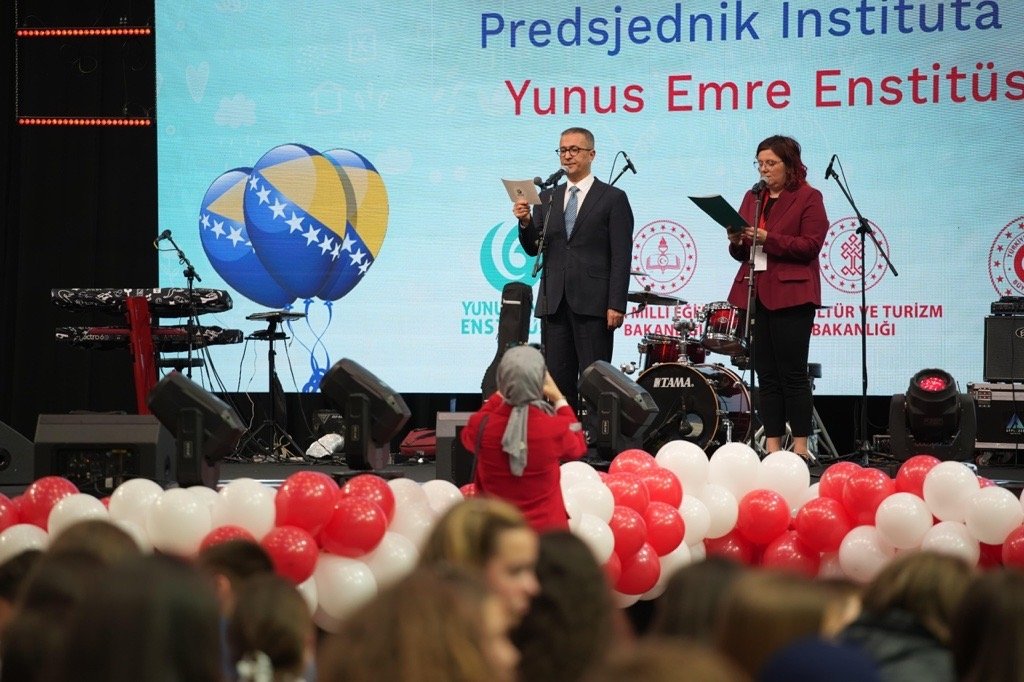© Turkuvaz Haberleşme ve Yayıncılık 2025
“A language is not just words. It is a culture, a tradition, a unification of a community, a whole history that creates what a community is. It’s all embodied in a language.” This quote, attributed very often to the American philosopher and linguist Noam Chomsky, summarizes the power of language for a sense of unity in a community and the importance of the mother tongue. What can be added to this notion is the power of language that can also connect communities with shared or distinct heritages. In other words, while language solidifies the unity and sense of identity within a community, it can also act as a bridge between communities, close or distant. A good example of this phenomenon is the power of the English and Arabic languages and their ability to connect distinct peoples to one another internationally.
Moreover, the influence of languages can also act as an instrument of what is termed as "soft power" in terms of international relations. Political scientist Joseph Nye is one of the theorists who coined the term “soft power” and helped shape American foreign policy thinking for decades. Nye, who argued that “soft power is the ability to get what you want through attraction rather than coercion or payments,” passed away on May 6 at 88.
Indeed, language is a fundamental element of the "soft power" as it is one of the most powerful and subtle tools for influence, connection and cultural transmission. Languages enable states to export their culture, build global networks and shape international perception, often more effectively than economic or military tools.
Last week, Türkiye’s Yunus Emre Institute (YEE) hosted me for the 12th Children’s Festival in Zenica, Bosnia-Herzegovina. Some 5,500 students were at the festival, organized under the theme of “My Choice is Turkish,” from different parts of Bosnia-Herzegovina. These children were all students of the Turkish courses, as an elective course, in their respective schools. They all waved both Bosnian and Turkish flags and sang Turkish and Bosnian songs during the event. In a way, the seeds of a shared future were planted among the Turkish and Bosnian youth, and the event also hosted hundreds of Turkish students from sister-school projects in various cities in Türkiye.
The festival drew the participation of key figures from both Türkiye and Bosnia-Herzegovina. Among the attendees were Deputy Minister of National Education Ömer Faruk Yelkenci, Turkish Ambassador to Sarajevo Emin Akseki, Prime Minister of Zenica-Doboj Canton Nezir Pivic, YEE President Abdurrahman Aliy, Istanbul Provincial Director of National Education Murat Mücahit Yentür and Bursa Provincial Director of National Education Ahmet Alireisoğlu. Representatives from Turkish institutions, along with educators, students and guests, were also present.

Of course, the historical ties between Türkiye and the Balkans set a strong common ground given the shared historical past. Following the collapse of the Ottoman Empire in the early 20th century, it took some time for the newly founded Republic of Türkiye to reconnect with the region. Nevertheless, while today the Balkans remain a fragile region, Türkiye’s political and economic power has grown beyond, and the country has become a key actor in the region. Indeed, Türkiye’s engagement with the Balkans, as it has with other regions such as Africa, beginning in the 1990s, has acted as a bridge to reconnect with these regions through development aid and cultural diplomacy.
The YEE is one of the institutions that have been a key instrument in establishing Türkiye’s connection with these regions and continues to effectively operate to strengthen the basis of diplomatic relations as well as people-to-people connections. To date, the YEE has successfully coordinated Turkish as an elective course in most of the 10 cantons in Bosnia-Herzegovina.
During the event, Aliy’s remarks pointed to an important vision.
"Our children are learning Turkish and gaining a deeper understanding of Türkiye and our historical connections. To date, we have aimed to teach Turkish to nearly 20,000 children under the 'My Choice is Turkish' project."
Twenty thousand Turkish speakers is not a small number. The interest in Türkiye, of course, is not limited to these classes. Language at an early age, however, means understanding, connection, mutual projects and strengthening of ties for coming generations. These children will become the future’s leaders, engineers and social scientists, and their work will be the future’s reality. Thus, their connection with Türkiye, a country with growing influence not only in the Balkans but internationally, is indeed important. This is not only because of Türkiye’s soft power influence over the Balkans through language programs, but also because of Türkiye’s role as a stabilizing political actor with "prestige" and trustworthiness in the region.
